Nucleo-cytoplasmic interaction in seedless cybrid citrus
Male sterility is important for seedless citrus breeding. A long juvenile phase and nucellar polyembryony leads to low efficiency of hybrid breeding in citrus. The Citrus research group in National Key Laboratory for Germplasm ...









